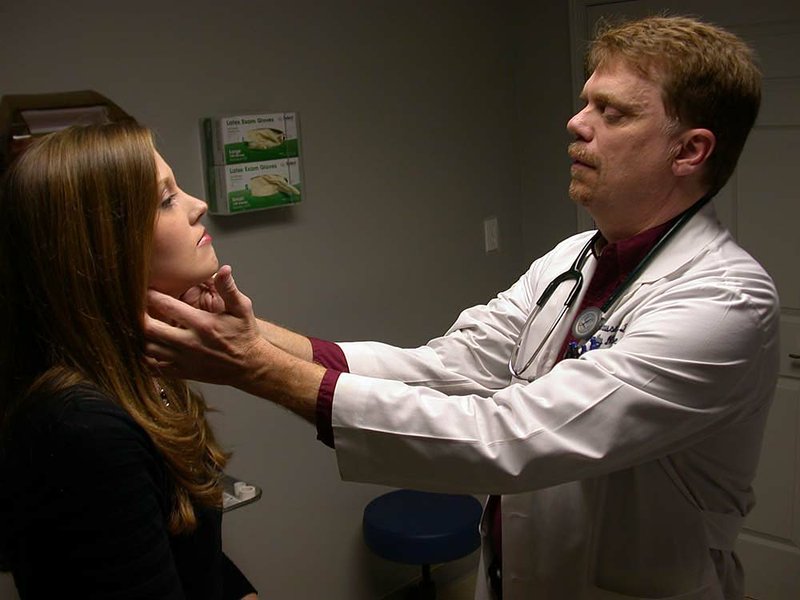BONO — Patients routinely call John House’s clinic to set up appointments for Thursdays, asking how much medical care a chicken, a few jars of honey or some homemade pies can buy.
In lieu of payment, patients at the Bono Barter Clinic can exchange a variety of things such as produce or labor for medical services on Thursdays. House devotes the other four days of the workweek to his regular family practice - the House Medical Clinic - both practices in a former church along U.S. 63 between Bono and Jonesboro.
“When I came here, I saw an awful lot of people couldn’t afford to pay for medical health care,” House said. “I realized our country is in trouble. This is more of a response to a need.”
Most of his Thursday patients have no medical insurance. Some have been laid off, and others work for themselves and can no longer afford insurance premiums, he said.
House has an employee who assigns a monetary value, for tax purposes, to each item that patients barter.
“It’s a way of saying, ‘Let’s get back to the basics of health care,’” House said. “It’s not about what you can afford, but what you can do.”
Since opening the Bono Barter Clinic in January, House has received, among other things, two chickens, a turkey, several jars of honey, desserts, green beans and an antique oil lamp as payment.
David Wroten, executive vice president of the Arkansas Medical Society in Little Rock, said he is unaware of any other doctor operating a bartering clinic in the state.
“It’s a novel, throwback approach,” Wroten said. “He should be commended.”
Wroten added, “The philosophy is that even if someone may not be insured, they can receive health care. This is a way to give patients some responsibility for that.”
House, 50, was raised in northeast Arkansas and went to high school in Weiner. He was interested in medicine as a youngster but said he was not disciplined enough to pursue a medical career and instead developed an Internet-provider business in Fort Lauderdale, Fla.
However, 14 years of life in the busy south Florida city didn’t suit House well. He wanted to return to a smaller town where people knew one another, he said.
“I wanted to give back,” he said. “I wanted to be able to get into family medicine where I could treat the whole family.”
He moved back to Arkansas in 2001 and enrolled at the University of Arkansas for Medical Sciences. After completing his residency work at the Area Health Education Center in Jonesboro, he opened the House Medical Clinic last August.
The Bono Barter Clinic followed five months later.
“I opened it and said, ‘Let’s see what happens,’” House said. “This way, people can do what they know how to do and trade it for health care.”
On a recent Thursday, Dennis Metz, 51, traded House an antique oil lamp for a checkup on his 19-year-old knee replacement.
Metz’s knee had flared up in pain. But the Jonesboro man was left without insurance when he was laid off from his factory job in 2010 and had not seen a doctor since.
“Everything’s getting higher and higher, and there’s less jobs,” he said. “This makes a difference.”
Metz said he plans to exchange garden-grown vegetables for a follow-up visit with House this spring.
Stacey Quayle of Bono, a stay-at-home mother with three children, said House’s clinic was “an amazing idea.”
“This takes it to a personal level,” she said. “Most doctors won’t do this. If you don’t have insurance, they won’t see you. It’s like, ‘Do you know me, or do you know what level my insurance is?’
“He’s like old school,” she said. “If this wasn’t here, I’d have to let my [doctor visits] slide.”
Quayle, who teased the doctor about making “House calls,” paid for her checkup with vouchers for homebaked pies and cakes.
Others have compared him with the lead character in the popular television show House - both use a cane. People would even steal his white medical coat because it bore the same name in script, “House, M.D.”
As patients visited with House throughout his bartering clinic day, others came to set up appointments and ask about making trades.
On his clinic wall, he posts a list of items he could use, including home-canned foods, fruits and vegetables, homemade quilts, shovels, axes, hoes, baskets, welding work, brick-laying, fresh-caught fish and other items.
“I’m not running a pawnshop,” House said. “I’m not giving charity. People are still paying for medical care. I want them to appreciate what they are getting by doing something for it.”
Front Section, Pages 1 on 02/28/2011
